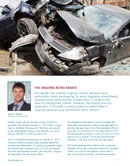THE ONGOING RETRO DEBATE
Author(s): Darcy R. Merkur
February 1, 2017
The debate over whether ongoing Ontario personal injury automobile claims are impacted by recent legislative amendments received some clarity recently, at least when it comes to the issue of prejudgment interest. However, the dispute over the application of annually increasing statutory deductibles to ongoing personal injury automobile claims remains.
Ontario motor vehicle accident victims involved in accidents that predate January 1st, 2015 will no longer have to entertain the argument that they are caught by the prejudgment interest rate reduction set out in section 258.3(8.1) of the Insurance Act.
Since its legislative introduction on January 1st, 2015, insurance defence lawyers have regularly taken the position that defendants in ongoing automobile claims (associated with accidents prior to 2015) can benefit from the prejudgment interest rate reduction, arguing the legislation has retroactive effect. The legislative amendment served to replace the favourable prejudgment interest rate applicable on general damage claims from the mandated 5% per year rate set out in Rule 53.10 of the Rules of Civil Procedure with the lower Courts of Justice Act (CJA) rate set out in section 130 (a rate that has been between 1.3% and 1% for the last few years).
The higher prejudgment interest rate on general damage claims was a welcome feature for accident victims not only for the obvious reason that it was much higher than the CJA rate but because it gave a financial incentive to insurers to pay out claims efficiently rather than face the 5% per year interest rate. With the lower prejudgment interest rate, plaintiff’s personal injury lawyers have feared that insurers would hold on to funds rather than expeditiously pay out claims given that they could earn rates of return far superior than the CJA rate by holding on to the money.
After a series of conflicting judicial decisions relating to the retroactive effect of the legislative amendment, the Divisional Court of the Ontario Superior Court of Justice in Carr v. Modi, 2016 ONSC 7255 (CanLII), released on December 1, 2016, held that the issue of the applicable prejudgment interest rate is a substantive issue and that therefore it is presumed not to have retroactive effect. Accordingly, the Divisional Court decided, in their binding decision, that the 5% prejudgment interest rate continues to apply on general damage claims for motor vehicle cases involving accidents prior to 2015.
Justice Molloy, writing for the unanimous Divisional Court writes:
“We agree with the motion judge that the new legislation is substantive not procedural and is presumed not to have retroactive effect. There is no language in the legislation, expressed or implied, to support giving the amendment retroactive effect. For the reasons stated by the motion judge, we find that the applicable rate is 5%.”
The issue of whether legislative amendments can impact ongoing claims continues to be a source of major contention throughout the personal injury landscape. The other more significant battle that is underway relates to the application of the statutory deductible applicable on automobile claims in Ontario. The statutory deductibles were recently increased with inflation and there remains uncertainty about whether the new inflated deductibles apply to ongoing and historic claims. A binding decision on this issue has not yet been rendered; however, it seems odd and unfair that a general damage claim resolved for $124,000 on December 31, 2016, would be worth $37,385.17 less if it was resolved for that amount one day later (as that general damage amount would be eclipsed by the annually increased vanishing deductible limit as of January 1, 2017).
Imagine what insurers would do if, rather than increasing the deductibles, the government elected to remove the deductibles altogether or reduce them to a nominal amount? Insurers would insist that is unfair because premiums were collected on the basis of the deductibles as they then existed. Doesn’t that argument alone make it clear that the deductible quantum must be locked in as of the date of an accident rather than act as a moving target?
Every time there is a dispute about whether a legislative amendment may reduce a claimant’s entitlement, accident victims are put under even more pressure to compromise their claims. If the Ontario government is determined to continue to curtail and restrict the rights of innocent motorists, then perhaps when making legislative amendments they can specify that they are not trying to tamper with an accident victim’s already limited vested rights.
Darcy Merkur is a partner at Thomson Rogers in Toronto practising plaintiff’s personal injury litigation, including plaintiff’s motor vehicle litigation. Darcy has been certified as a specialist in Civil Litigation by the Law Society of Ontario and is the creator of the Ontario Personal Injury Damages Calculator.
Note, this article originally appeared in the February 3, 2017, issue of The Lawyers Weekly: Clarity on prejudgment interest but not deductible
View PDF version of the ABR Updater | Issue 36

Related Resources:
https://trlaw.com/resources/accident-benefit-reporter/articles/statutory-deductible-confusion/
Share this





